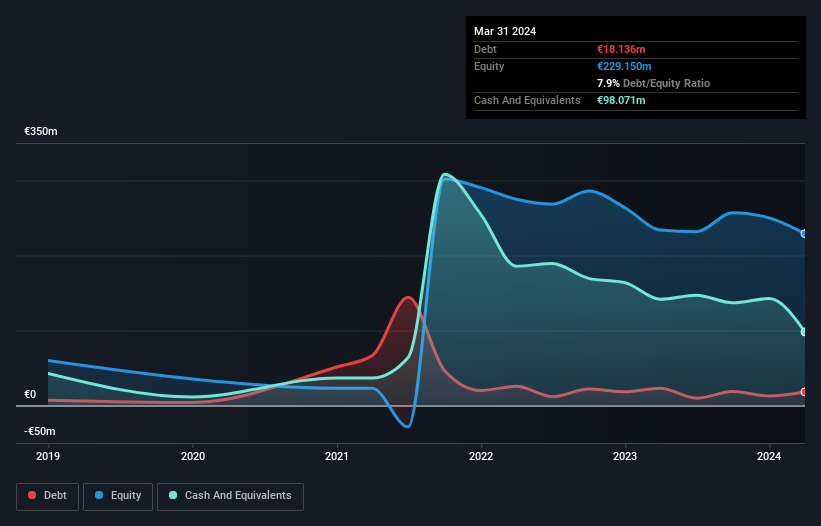Legendary fund manager Li Lu (who Charlie Munger backed) once said, 'The biggest investment risk is not the volatility of prices, but whether you will suffer a permanent loss of capital.' It's only natural to consider a company's balance sheet when you examine how risky it is, since debt is often involved when a business collapses. As with many other companies HomeToGo SE (ETR:HTG) makes use of debt. But the real question is whether this debt is making the company risky.
When Is Debt Dangerous?
Debt and other liabilities become risky for a business when it cannot easily fulfill those obligations, either with free cash flow or by raising capital at an attractive price. In the worst case scenario, a company can go bankrupt if it cannot pay its creditors. While that is not too common, we often do see indebted companies permanently diluting shareholders because lenders force them to raise capital at a distressed price. Of course, the upside of debt is that it often represents cheap capital, especially when it replaces dilution in a company with the ability to reinvest at high rates of return. When we examine debt levels, we first consider both cash and debt levels, together.
View our latest analysis for HomeToGo
How Much Debt Does HomeToGo Carry?
The image below, which you can click on for greater detail, shows that HomeToGo had debt of €18.1m at the end of March 2024, a reduction from €23.1m over a year. But on the other hand it also has €98.1m in cash, leading to a €79.9m net cash position.

How Healthy Is HomeToGo's Balance Sheet?
We can see from the most recent balance sheet that HomeToGo had liabilities of €81.6m falling due within a year, and liabilities of €40.1m due beyond that. On the other hand, it had cash of €98.1m and €18.9m worth of receivables due within a year. So its liabilities outweigh the sum of its cash and (near-term) receivables by €4.69m.
Since publicly traded HomeToGo shares are worth a total of €231.8m, it seems unlikely that this level of liabilities would be a major threat. But there are sufficient liabilities that we would certainly recommend shareholders continue to monitor the balance sheet, going forward. Despite its noteworthy liabilities, HomeToGo boasts net cash, so it's fair to say it does not have a heavy debt load! When analysing debt levels, the balance sheet is the obvious place to start. But it is future earnings, more than anything, that will determine HomeToGo's ability to maintain a healthy balance sheet going forward. So if you're focused on the future you can check out this free report showing analyst profit forecasts.
Over 12 months, HomeToGo reported revenue of €177m, which is a gain of 18%, although it did not report any earnings before interest and tax. That rate of growth is a bit slow for our taste, but it takes all types to make a world.
So How Risky Is HomeToGo?
Statistically speaking companies that lose money are riskier than those that make money. And we do note that HomeToGo had an earnings before interest and tax (EBIT) loss, over the last year. Indeed, in that time it burnt through €19m of cash and made a loss of €20m. While this does make the company a bit risky, it's important to remember it has net cash of €79.9m. That means it could keep spending at its current rate for more than two years. Overall, we'd say the stock is a bit risky, and we're usually very cautious until we see positive free cash flow. When analysing debt levels, the balance sheet is the obvious place to start. However, not all investment risk resides within the balance sheet - far from it. Be aware that HomeToGo is showing 2 warning signs in our investment analysis , you should know about...
When all is said and done, sometimes its easier to focus on companies that don't even need debt. Readers can access a list of growth stocks with zero net debt 100% free, right now.
Valuation is complex, but we're here to simplify it.
Discover if HomeToGo might be undervalued or overvalued with our detailed analysis, featuring fair value estimates, potential risks, dividends, insider trades, and its financial condition.
Access Free AnalysisHave feedback on this article? Concerned about the content? Get in touch with us directly. Alternatively, email editorial-team (at) simplywallst.com.
This article by Simply Wall St is general in nature. We provide commentary based on historical data and analyst forecasts only using an unbiased methodology and our articles are not intended to be financial advice. It does not constitute a recommendation to buy or sell any stock, and does not take account of your objectives, or your financial situation. We aim to bring you long-term focused analysis driven by fundamental data. Note that our analysis may not factor in the latest price-sensitive company announcements or qualitative material. Simply Wall St has no position in any stocks mentioned.
About XTRA:HTG
HomeToGo
Operates a marketplace for vacation rentals that connects users searching for a place to stay in Luxembourg and internationally.
Undervalued with high growth potential.
Similar Companies
Market Insights
Community Narratives




